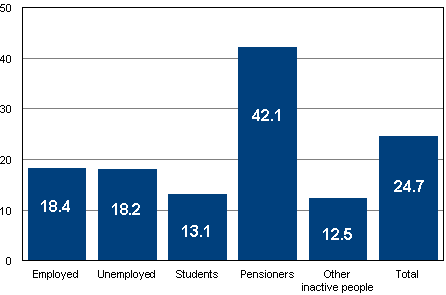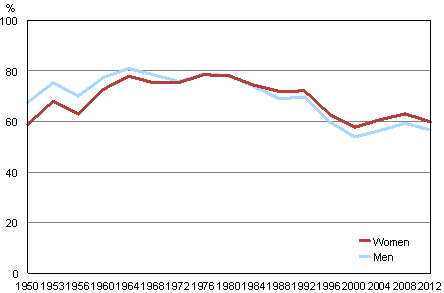Published: 14 March 2013
One-half of advance voters pensioners
Corrected on 19 March 2014. The corrected numbers
are indicated in red. Several complaints on Municipal elections
2012 have been filed to administrative courts and the results of
the elections have been changed by the decisions of administrative
courts (errors in source data have also been corrected).
One-half of advance voters (49.8%) in the Municipal elections 2012
were pensioners.
Of pensioners entitled to vote, 42.1 per cent voted in
advance, while, on average, only one-quarter of all persons
entitled to vote (24.7%) voted in advance. Advance voting was lower
than this in the other groups. In all, 18.4 per cent of
employed persons and 18.2 per cent of unemployed persons
voted in advance. Students and those in the other inactive
population voted the least often in advance. The data are based on
Statistics Finland's statistics on the Municipal elections
2012.
Share of advance voters among persons entitled to vote according to main type of activity in Municipal elections 2012, %

The probability of advance voting grew primarily with age. Persons entitled to vote aged 65 to 74 were the most active advance voters, as 47.0 per cent of them cast their vote in advance. The corresponding percentage was 41.6 among those aged over 75. Younger age groups voted less often in advance. Among persons aged 18 to 24, 9.5 per cent voted in advance, 12.6 per cent of those aged 25 to 44, and 26.3 per cent of those aged 45 to 64.
Advance voting turnout varied according to the size of the municipality. In small municipalities with fewer than 2,000 inhabitants, 36.8 per cent of persons entitled to vote cast their vote in advance, while in municipalities with over 100,000 inhabitants this share remained at 21.5 per cent. In small municipalities, young people also voted in advance clearly more often than in large ones. With respect to family status, advance voting was lowest among young adults living at home and highest among people without a family as well as married and cohabiting. Married or cohabiting persons aged 65 or over were the most active at voting in advance. Advance voting was also more probable among persons with higher education.
Persons with foreign background voted in advance less often than persons who had no foreign background. The probability of advance voting grew with age for persons entitled to vote with foreign background as well. Older age groups had most differences in advance voting turnout of persons with or without foreign background. Just 11.4 per cent of persons aged 45 to 64, whose both parents were born abroad, voted in advance. Of persons in the same age group with one parent who was born abroad, 25.6 per cent voted in advance and 27.1 per cent of those with Finnish background.
In the Municipal elections 2012, the voting turnout of both women and men fell lower than in the previous elections. The last time women's voting turnout has remained below 60 per cent was in the 2000 Municipal elections and before that in the 1950 Municipal elections. Voting turnout went down for both sexes in all constituencies and was higher in rural municipalities than in semi-urban or urban municipalities.
Women's and men’s voting turnout in Municipal elections 1950–2012, %

The growth in the shares of female candidates, votes cast for women and elected female councillors that had continued for decades, halted in the Municipal elections 2012. The shares varied greatly by municipality and party.
The share of female candidates (38.8%) fell from the previous elections in all constituencies apart from Lapland and was over 40 per cent only in the constituencies of Helsinki, Uusimaa and Varsinais-Suomi.
Female candidates gained 40.7 per cent of all votes cast. The Green League was the only party where women gained over one-half (62.7%) of the votes cast for the party. Relative to the share of female candidates, women gained the most votes in the constituencies of Helsinki and Uusimaa, and the least in the constituency of Kymi. Women fared better in urban municipalities than in semi-urban or rural municipalities. In rural municipalities, women's share of votes cast (35.2%) was clearly smaller than that of female candidates (38.3%). In urban municipalities the situation was the opposite.
As typical for Municipal elections, the share of elected female councillors, 36.2 per cent, was lower than the share of votes cast for women on the level of the whole country. Women gained a majority to the municipal councils of six municipalities. In the 2008 Municipal elections, thirteen female-majority councils were elected. The share of elected female councillors and the share of votes cast for women were divided similarly according to municipalities' degree of urbanisation as the share of candidates: in urban municipalities relatively more women gained votes and got elected than in semi-urban or rural municipalities.
Statistics Finland's election result services
Statistics Finland publishes a review of the Municipal elections that examines advance voters and the voting turnout and success of both sexes in the elections.
More detailed election result data are available in Statistics Finland's PX-Web database service.
Source: Municipal Elections 2012, Review of advance voting and women's and men's success in the elections, Statistics Finland
Inquiries: Miina Keski-Petäjä 09 1734 3240, Jaana Asikainen 09 1734 3506, vaalit@stat.fi
Director in charge: Riitta Harala
Publication in pdf-format (581.8 kB)
- Reviews
-
- 1. Advance voters in Municipal elections 2012 (14.3.2013)
- 2. Women and men in Municipal elections 2012 (14.3.2013)
- Tables
-
Tables in databases
Pick the data you need into tables, view the data as graphs, or download the data for your use.
Appendix tables
- Quality descriptions
-
- Municipal elections, quality description (14.3.2013)
Updated 2.4.2013
Official Statistics of Finland (OSF):
Municipal elections [e-publication].
ISSN=2323-1114. 2012. Helsinki: Statistics Finland [referred: 19.4.2024].
Access method: http://www.stat.fi/til/kvaa/2012/kvaa_2012_2013-03-14_tie_001_en.html

